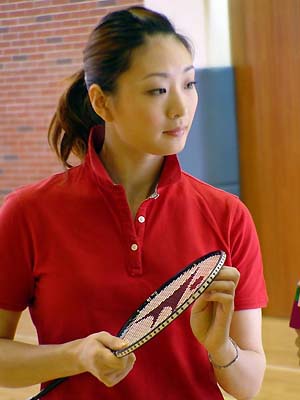Beijing 2008, China's first TV series with an
Olympic Games background will debut in August, reports Sohu Entertainment.
The TV series features former badminton world champion Gong Ruina as a
professional badminton player alongside other actors and sports stars promoting
the spirit of the Games.

Former badmintion
world champion Gong Ruina was in the TV
series.[sohu.com] |
Beijing mayor Wang Qishan stressed city residents should display good manners
and have basic sports knowledge during the Games. The TV series takes up this
theme too.
The 20-episode series will depict 20 different Olympic sports, and the five
leading actors share the names of the five colorful 2008 Olympic mascots
"Friendlies".
Each of the mascots has a rhyming two-syllable name; for example, Beibei is
the fish, Jingjing is the panda, and so on. When these names are put together,
they form a Chinese sentence "Bei Jing Huan Ying Ni", meaning "Welcome to
Beijing".
The closely linked episodes aim to boost national sporting fervor ahead of
the 2008 Beijing Games, for a survey conducted in Beijing and six other co-host
cities including Qingdao, Hong Kong, Tianjin, Shanghai, Shenyang, and
Qinhuangdao showed Chinese, especially young people, have limited understanding
of the 2008 Beijing Olympics.
Outlook Weekly, news magazine supervised by Xinhua News Agency, also
investigated the issue and found over 70 percent of interviewees in Beijing had
no idea about the Olympic slogan and concepts.
When asked about the focus of the Games, most Shanghai citizens wondered
whether top men's hurdler Liu Xiang from Shanghai could take the title again.
They didn't know that Shanghai is one of the Games co-host cities. .
The situation is better in Tianjin and Qingdao, where most of the locals are
proud to be part of the Games.
Mr. Wang, a taxi driver from Tianjin told the reporter, "I am learning
English now. I will try my best to provide the best service for the Games."
In Qingdao, surveyed students knew a lot about the mascots, slogan and
concepts, and expressed almost unanimous willingness to serve at the Games.
Nearly all the students randomly sampled at the China People's University,
Tianjin University, Tianjin Normal University, Communication University of
China, and Nankai University had a clear basic knowledge of the Olympics. They
knew about things like the slogan, concepts, and mascots.
China People's University Professor Jin Yuanpu says failing to answer
questions correctly doesn't necessarily mean people aren't interested in the
2008 Beijing Games.
"A Gallup opinion poll commissioned by the Chinese government in November
2001 showed 94.9 per cent of the public in favor of the Games. The International
Olympic Committee's own surveys found even higher support," he says.
An unnamed journalist who reported on the Athens Games said local people have
little enthusiasm for the Olympics.
"A taxi driver even don't know where the Games media center was," he noted.
Jin says it's not necessary to require all Chinese to accurately answer all
the questions, as they aren't preparing for a formal Olympic knowledge contest.
"If people have basic understanding of the Games, show their support towards
them and are willing to provide voluntary services, that's good enough."
When asked about the low rate of accurate Olympic knowledge, Jin said,
"Chinese have great enthusiasm for the Olympic Games and the survey just shows
people have different ways of understanding. It doesn't infer that they are
indifferent to the Games."
"For example, the interviewees know about the anthropomorphous Olympic stamp
but have only a vague idea that the stamp is actually the Olympic emblem," Jin
explained.